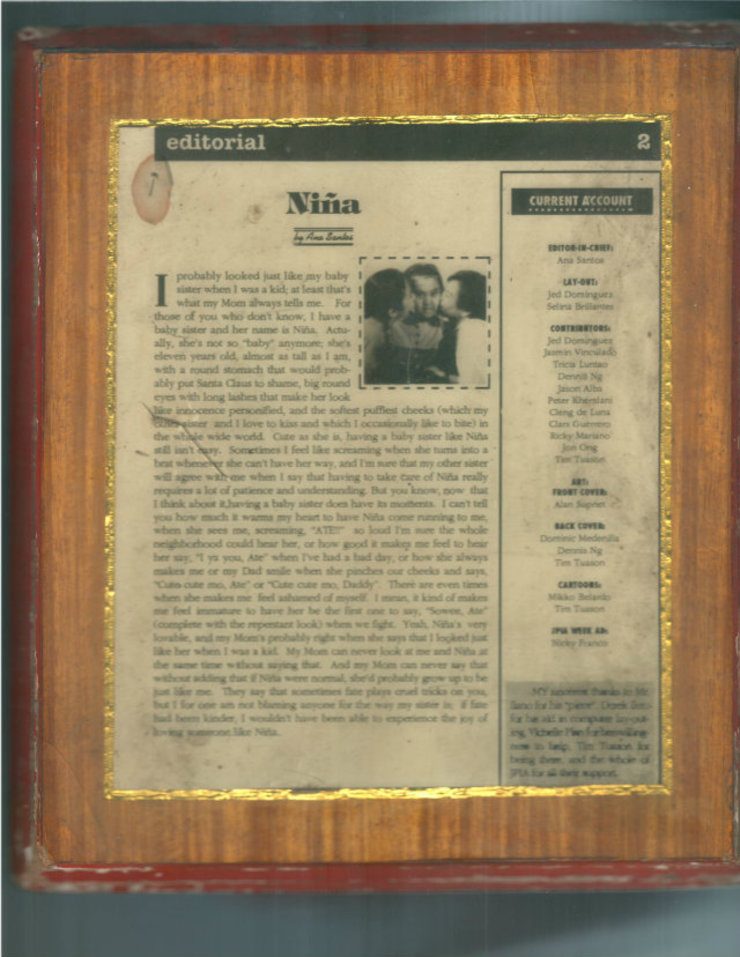SUMMARY
This is AI generated summarization, which may have errors. For context, always refer to the full article.
 A couple of weeks ago, I came across a blog post by Michelle Aventejado, who wrote about her youngest daughter, Gelli and ending the “R word.” Gelli was born with Down’s Syndrome and Michelle wrote her post after seeing some high–profile people use the R word on Twitter. She called out to everyone to end the R word and create awareness and an environment of inclusiveness for children with special needs.
A couple of weeks ago, I came across a blog post by Michelle Aventejado, who wrote about her youngest daughter, Gelli and ending the “R word.” Gelli was born with Down’s Syndrome and Michelle wrote her post after seeing some high–profile people use the R word on Twitter. She called out to everyone to end the R word and create awareness and an environment of inclusiveness for children with special needs.Her post reminded me of an article I once wrote about my youngest sister, Niña, for my college org’s newsletter. My mother was so happy about the piece that she had it laminated (goes to show you how old it is) and I asked my younger sister to dig up the article for me.
I’m re-printing it here.
I probably looked just like my baby sister when I was a kid; at least that’s what my Mom always tells me. For those of you who don’t know I have a baby sister and her name is Niña.
Actually, she’s not so “baby” anymore; she’s 11-years old, almost as tall as I am, with a round stomach that would probably put Santa Claus to shame, big round eyes with long lashes that make her look like innocence personified, and the softest puffiest cheeks (which my other sister and I love to kiss and which I occasionally like to bite) in the whole wide world.

Cute as she is, having a baby sister like Niña still isn’t easy. Sometimes I feel like screaming when she can’t have her way, and I’m sure my other sister will agree with me when I say that having to take care of Niña really requires a lot of patience and understanding.
But you know, now that I think about it, having a baby sister does have its moments. I can’t tell you how much it warms my heart to have Niña come running to me, when she sees me, screaming, “ATE!” so loud I’m sure the whole neighborhood can hear her, or how good it makes me feel to hear her say, “I ya you, Ate” when I’ve had a bad day, or how she always makes me or my Dad smile when she pinches our cheeks and says, “Cute, cute mo, Ate” or “Cute, cute mo, Daddy”.
There are even times when she makes me feel ashamed of myself. I mean, it kind of makes me feel immature to have her be the first one to say, “Soweee, Ate” (complete with the repentant look) when we fight. Yeah, Niña’s very lovable and my Mom’s probably right when she says I looked just like her when I was a kid.
My Mom can never say that without adding that if Niña were normal, she would probably grow up to be just like me. They say that sometimes life plays cruel tricks on you, but I for one, am not blaming anyone for the way my sister is; if life had been kinder, I wouldn’t have been able to experience the joy of loving someone like Niña.

Niña
My baby sister, Niña, is now 32 years old and my daughter is only a little older than Niña was when I wrote this.
Reading this again, I was reminded of how one family member tried to dissuade me from writing this piece. She asked me, “What will you write about? Niña’s weaknesses? What for?”
Until she had asked me that, it never crossed my mind that the only thing that could be written about my sister was her weaknesses.
But at that time, that was what mental disabilities were –misunderstood weaknesses that were not to be talked about out in the open… until someone would see or meet Niña and inevitably ask my mother, “Ano siya?” [What is she?]
Special needs
Other people’s open curiosity and sometimes thinly veiled pity weighed heavily on my mother. My other sister and I grew up seeing my parents – mostly my mother — wrestle with how to explain or deal Niña’s special needs
They “talked about it” in terms of should-have’s and will never be’s. They “talked about it” through occasional outbursts like when my mother would wistfully say that if only Nina were normal, she would grow up to be just like me.
When my daughter was born as the first grandchild, the family excitedly cooed over her every little new achievement and applauded her every new word, I would again see the same wistfulness in my mother when I would catch her look at my daughter and look at Niña.
Sometimes, I sensed their pensiveness turn into frustration and gradually evolve into resignation.
Feeling of isolation
With the lack of information, resources and support groups, they just kind of lost hope. For awhile, I resented what I perceived to be their lack of effort, their misplaced need to overcompensate for Niña by pushing me and younger sister to strive.
After reading Michelle’s post, I had a chance to talk to her. I told her about Niña and she told me about Gelli. I realized that I had not really talked to anyone about Niña in a long time. Except for my other sister, I didn’t think anyone would really understand.
After our conversation, Michelle told me, “Thirty something years ago, your mother must have felt so alone at the time.”
And that’s when I thought of digging up this article and sharing it here, with a wider audience than my school org. No father, no mother and no sibling of a child with special needs should ever have to feel alone.
Because often, it is not a loved one’s mental disability that is most difficult to deal with. It is isolation. – Rappler.com
Ana P. Santos is a regular contributor for Rappler apart for her DASH of SAS column, which is a spin off of her website. Follow her on Twitter at @iamAnaSantos. Read other essays by Ana Santos.
iSpeak is Rappler’s platform for sharing ideas, sparking discussions, and taking action! Share your iSpeak articles with us: move.ph@rappler.com.
Tell us what you think about this iSpeak article in the comments section below.
Add a comment
How does this make you feel?
There are no comments yet. Add your comment to start the conversation.